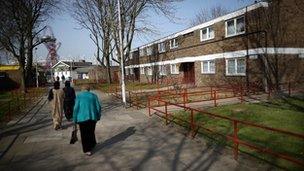Mayoral election: London's housing crisis
- Published

Ten apartments in the Shard are set to cost between £30m to £50m
For many Londoners, the high cost of homes, the limited availability of mortgages and low or insecure incomes put home ownership, even that offered through low cost schemes, out of reach.
But just how difficult is it to get on the property ladder?
In London, average houses prices are 51% higher while private rents are 64% higher than the rest of England according to the Greater London Authority (GLA).
The GLA also says first time buyers are paying an average deposit of 28%, about £97,000.
So with the capital's population set to rise from 7.6 million to nearly 9 million by 2031, will there be enough homes for everyone?
Currently London's mayor has to work with organisations to bring together funding, land and permission to build homes.
However from May the rules change when the entire housing budget and over 500 hectares (1.2m acres) of public land transfers to the GLA.
'Bitter pill'
One of the main problems is the number of households is predicted to grow due to later marriages, fewer children, divorce and longer lives.

Housing estates have been built near the Olympic Park
Of the 750,000 to 850,000 additional households that London will need by 2031, almost 75% will be single person households, according to London's Housing Strategy.
Russ Tams, 30, works in post production and rents a two bedroom flat for £1,300 per month in east London.
He said he has given up trying to buy as it was too difficult to get a mortgage.
"All my friends in the north are buying houses so it's a bitter pill to swallow. I can't do my job anywhere else so I need help. It should be a little easier to get on the housing ladder," he said.
"We need to look at the renting market and make some more social rather than build new builds."
'Locked out'
Housing charity Shelter has launched a campaign ahead of the mayoral election to push for as much emphasis on housing as there has been on transport.
Shelter's chief executive, Campbell Robb, said: "Decades of failure to build enough affordable housing has left huge swathes of Londoners locked out of home ownership, pushed into a revolving door of private let after private let."
Tim Hyatt, president of the Association of Residential Letting Agents (ARLA) and head of lettings for estate agents Knight Frank, said there was a core shortage for prime central London properties being offered for rent for between £200 and £750 per week.
He said although the market was always busy, the demand was still exceeding supply and getting progressively worse.
Mr Hyatt believes rents will increase by between 5% to 10% in the next year, however some areas may have higher increases.
For example, rent for a one bedroom property in Highbury, north London, is 10% more than this time last year, while rent for a property in Knightsbridge, west London, has decreased as the "demand from mid to senior management is not there anymore," he said.
"Properties for a young first time renter is where the demand is," he added.
'Too few people'
Mr Hyatt said more could be done to free up housing stock because otherwise rents would increase further which would have the impact of people not being able to rent or buy.
However Mr Tams said he was "fed up of hearing" of the need to build more houses as little were available because "too few people own too many properties".
Mr Hyatt said developers had to sell the properties as quickly as possible so they have enough money to build the next project.
This may mean that developers choose to sell 20 properties to a single owner with a 20% discount rather than to individuals.
The candidates for London mayor have housing policies including:
Siobhan Benita (Independent): Create a fixed price housing market and bring 20,000 homes to the market each year
Carlos Cortiglia (BNP): Provide extra housing and to expand the power of GLA
Boris Johnson (Conservative): Build 55,000 affordable homes by 2015 and increase landlord accreditation
Jenny Jones (Green): Renovating 37,000 empty council homes and support development of housing co-ops
Ken Livingstone (Labour): Establish a London-wide lettings agency and bring back a target of 50% of new developments to provide social housing
Brian Paddick (Lib Dem): Crack down on rogue landlords and restart council home building
Lawrence Webb (UKIP): Cut council waiting lists in half by filling empty properties and prioritise needs of long-term Londoners
- Published17 April 2012